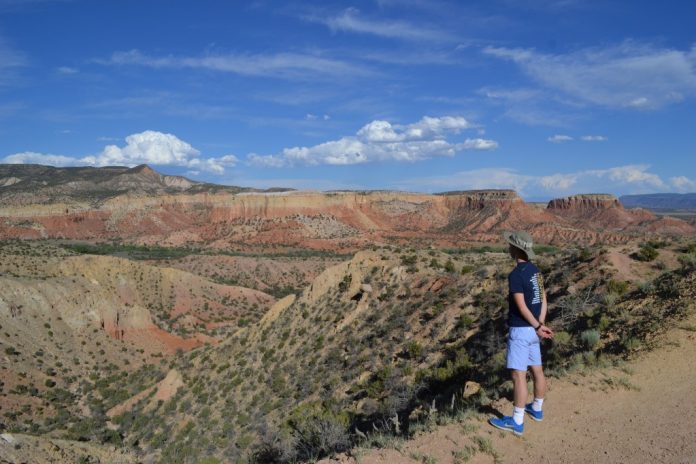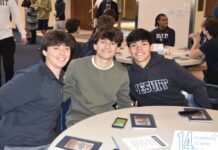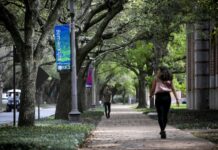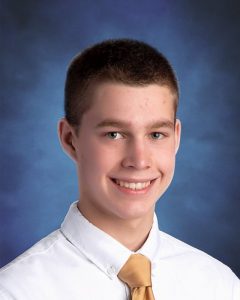 Either in the halls or in class, many students have probably seen Michael Boyson ’16 around Jesuit at least a few times. For those who see him on a regular basis, it might be known that he is an honors student, a varsity swimmer, and a participant in a variety of Jesuit’s clubs. However, it is likely that very few people are aware of Michael’s proficiency at the violin, his extensive community service, or his archeological work in New Mexico, all principle components in his journey to achieve the Congressional Gold Award. Exceedingly humble, Michael has worked in silence since the eighth grade to fulfill the rigorous requires demanded by the prestigious award.
Either in the halls or in class, many students have probably seen Michael Boyson ’16 around Jesuit at least a few times. For those who see him on a regular basis, it might be known that he is an honors student, a varsity swimmer, and a participant in a variety of Jesuit’s clubs. However, it is likely that very few people are aware of Michael’s proficiency at the violin, his extensive community service, or his archeological work in New Mexico, all principle components in his journey to achieve the Congressional Gold Award. Exceedingly humble, Michael has worked in silence since the eighth grade to fulfill the rigorous requires demanded by the prestigious award.
The Congressional Award aims to challenge America’s youth by focusing on four main areas: voluntary service, personal development, physical fitness, and expedition/exploration. From ages thirteen to twenty-three, young people can register to work toward six different levels of achievement, with the gold medal being the most difficult to attain. By earning the gold medal, Michael has completed 400 hours of community service, 200 hours devoted to self-improvement in the form of the violin, 200 hours of physical fitness in the form of swimming, and an exploration of Abiquiu, New Mexico with professors from University of California Berkeley. It is not a surprise, then, why participants are allotted ten years to complete all of the requirements, but it is even more remarkable that Michael was able to meet his goal in less than half that time.
First learning about the award the summer before his freshman year, Michael said he “decided to complete the requirements for the Gold Medal by my junior year.” Already participating in many of the activities that the award requires such as community service and physical fitness, he thought that striving for the gold medal would be a realistic goal. In fact, Michael describes himself as a “very goal oriented person,” a character trait that would work in tandem with the award to “help me hone my skills and accomplish much more than I previously thought I could.” In addition to helping himself develop, Michael also hoped to “help the community grow and develop” as a result of his efforts.
Assisting those around him, Michael completed over 400 hours of community service by volunteering between Christian Community Action and Baylor Medical Center in Garland. Diversified in his outreach, Michael fed the homeless and needy almost every Saturday morning at the CCA and assisted in the ICU, Gastrointestinal Lab, information desk, and admitting/registration at the medical center.
To prove his personal development, Michael challenged himself to practice, complete, and perform a solo from the first movement of Haydn’s Concerto No. 2 in G Major, supplementing the other 200 logged hours of practicing and performance. In addition, Michael played with the New Conservatory of Dallas Orchestra under the late Arkady Fomin. In particular, Michael fondly remembers playing at Mr. Formin’s annual Symphony of Toys at the Myerson Symphony Center benefitting the WFAA-TV Santa’s Helper Toy Drive.
Easily achieving the 200 hours for physical fitness, Michael swam for both the Dallas Mustangs club swim team and Jesuit’s Varsity swim team. At the beginning of the latest season, he set the personal goal of breaking one minute in the hundred yard butterfly. Not stopping at achieving his goal, Michael went above and beyond to finish with a 56.59.
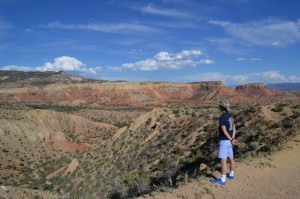 Finally, for the fourth area of the Congressional Award, Michael chose to go on an archeological exploration to Abiquiu, New Mexico. He believes that “having the opportunity to go on an archaeological dig in New Mexico probably made me stand out from the crowd” because, as the Congressional Award website admits, most applicants simply choose to go on an expedition which would normally consist of a camping trip and geographical education. It was only at the last minute that Michael decided he wanted to break away from the crowd and go on an exploration that would be different and challenging. During the seven days and six nights he was there, Michael worked with students and professors from University of California Berkeley to unearth ceramics, arrowheads, and bones dating back to the 18th and 19th century. However, Michael did not just limit himself to scientific work; he also “interviewed one of the village elders, visited historical sites, and hiked on Ghost Ranch.” Due to the sheer amount of work that he did while on his exploration, Michael decided to write a paper chronicling his adventures. “I really enjoyed writing this documentary on my trip, and I feel that because of Jesuit’s great English department, I was given the skills necessary to write competitively.”
Finally, for the fourth area of the Congressional Award, Michael chose to go on an archeological exploration to Abiquiu, New Mexico. He believes that “having the opportunity to go on an archaeological dig in New Mexico probably made me stand out from the crowd” because, as the Congressional Award website admits, most applicants simply choose to go on an expedition which would normally consist of a camping trip and geographical education. It was only at the last minute that Michael decided he wanted to break away from the crowd and go on an exploration that would be different and challenging. During the seven days and six nights he was there, Michael worked with students and professors from University of California Berkeley to unearth ceramics, arrowheads, and bones dating back to the 18th and 19th century. However, Michael did not just limit himself to scientific work; he also “interviewed one of the village elders, visited historical sites, and hiked on Ghost Ranch.” Due to the sheer amount of work that he did while on his exploration, Michael decided to write a paper chronicling his adventures. “I really enjoyed writing this documentary on my trip, and I feel that because of Jesuit’s great English department, I was given the skills necessary to write competitively.”
When Michael was first received the email about the Congressional Award, “the first thought that went through my mind was ‘I am so glad that all my hard work paid off.’” Finally receiving gratification for the years spent working toward a single goal, Michael felt “like a giant rush of relief just flew over me. It was a very surreal moment; very similar to the feeling I had on the day I found out I got accepted into Jesuit.” Unfortunately, Michael will be unable to travel to Washington D.C. to accept the award due to his new focus: military academy. During the week of the award ceremony, Michael was selected to attend the Air Force Academy Summer Seminar. Always looking towards the next goal, he said it was “a tough decision, but I feel it was the best one.”
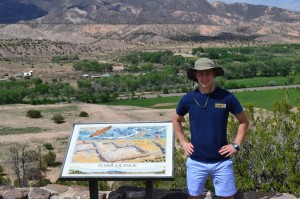 It should be noted, though, that Michael did not rough it alone. In fact, Mr. Host, his freshman guidance counselor, “was my advisor and mentor throughout the entire program and I am very grateful to have his guidance for the past three years at Jesuit,” stated Michael.
It should be noted, though, that Michael did not rough it alone. In fact, Mr. Host, his freshman guidance counselor, “was my advisor and mentor throughout the entire program and I am very grateful to have his guidance for the past three years at Jesuit,” stated Michael.
Thinking back to Michael’s application, Mr. Host remembered how Michael submitted a video of himself playing the violin, a “really rare” occurrence that, along with his other remarkable qualities, immediately made him “one of those memorable kids.” Once accepted into Jesuit, it was Michael that approached Mr. Host, asking him to become his sponsor during the multi-year process.
To Mr. Host, the award represents someone who is “goal oriented, who is determined, who is passionate because it is a very difficult thing to earn. You have to really stick to it; you have to really want it.” Moreover, considering the young age at which Michael has earned the award, Mr. Host believes this determination speaks volumes about the resolve and perseverance of Michael’s character.
Frankly, Mr. Host admitted “[Michael] gives me credit for doing something that was all his.” Explaining that the extent of his work was signing a few papers, he asserted that the challenge “was all his.” To Mr. Host, Michael’s journey was really establishing character traits that he had already exhibited: traits of a motivator, a mentor, a leader. “This is just the start of establishing him in those roles and becoming even better at them. He’s going to be running the country or something, you know?”
Even with the success of Michael, Mr. Host hesitates to push other students in a similar direction due to the fact that it takes “so much dedication and long-range view. There are very, very ,very few freshmen or eighth graders who have that much long-range dedication.” Mr. Host went on to explain that a student would have to be identified very early on as having that level of dedication. Simply put, there are just not that many people with the same devotion as Michael Boyson.
Even though the Congressional award was Michael’s ultimate goal throughout his entire journey, he said he “will never forget all the friendships I made while volunteering at Baylor, Christian Community Action, and in New Mexico or participating in the New Conservatory of Dallas Orchestra.” In the end, it was the challenge the award posed that was most important to Michael: “this award will help put much of what I do in perspective, that no matter what, if I put my mind to it, I can achieve it.” He also hopes that his effort to extend past his comfort zone inspires other to do the same, to challenge themselves to see what they are truly capable of.
To learn more about the Congressional Award, click here.
To read Michael’s documentation of his New Mexico trip, click here.


